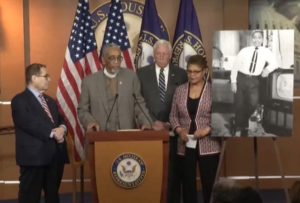Black People Are Not ‘Immigrants’
Now that an African-American president of the United States is the point person on the national debate about immigration, it’s time that the black perspective on the matter be examined.Now that an African-American president is the point person on the national debate about immigration, it’s time that the black perspective on the matter be examined.
President Obama gave a major address on immigration recently in Las Vegas. He spoke with an intimate insight into the immigrant experience. And well he should. Obama is himself a first generation African-American. But, in spite of his carefully crafted speech, an important and ironic omission jumped out at me. With the obligatory exception for native peoples, the president appealed to the nation with the well-worn cliché, “We define ourselves as a nation of immigrants. That’s who we are. …” I beg to differ. Black people are not immigrants.
We are as original as Americans get. Our ancestors arrived in Virginia a year before the Pilgrims landed at Plymouth Rock. The immigration conversation has never had adequate language to express the unique experience of black Americans. It has been suggested more than once that blacks should have done like other “immigrants” and overcome initial discrimination through hard work and education to join the American mainstream of success. The debate has never recognized the need for a unique term to distinguish the black experience from that of other “immigrant” groups. But now that an African-American president of the United States is the point person on the national debate about immigration, it’s time that the black perspective on immigration be examined.
What term could properly capture the reality of a people who were involuntarily imported as slaves? Surely the word “immigrant” is insufficient to that task. “Human trafficking” has recently been introduced to the immigration debate, mainly in reference to what many call “modern-day slavery” involving agricultural, sweatshop, domestic and sex workers. These modern-day slaves come primarily from Mexico, Eastern Europe, Latin America and Asia. Human trafficking seems to be just as good at describing the old-fashioned African slavery as the modern-day type. Black people were not immigrants; we were trafficked people.
Trafficked Africans (and their descendants) slaved as agricultural, domestic and sex workers for 250 years, first in the colonies and later in the United States of America. For the next 100 years, those in the South lived in virtual peonage and not until the passage of the Voting Rights Act of 1965 did the majority of black Americans begin to enjoy anything resembling full citizenship.
All of this is not to suggest that black people have nothing to add to the conversation about immigration today. To the contrary, our experience is key to the main sticking point in the current proposals — a path to citizenship. It took black Americans 350 years to get to the end of our path to citizenship. It was a path strewn with struggle, division, hatred and violence.
House Republicans’ insistence on unachievable security requirements, prerequisites, triggers and other delaying devices seems intent on repeating this pattern. We are poised to create a system that will legalize immigrants’ labor, collect their taxes, deny their citizenship and foster a resentful group of second-class noncitizens. As British statesman Edmund Burke warned, “Those who don’t know history are destined to repeat it.”
Democrats have made a compelling humanitarian case for immigration reform based on worker exploitation, the need for family reunification and the innocence of children brought here by their parents. But they have failed to make an equally compelling political case for immigration reform. A reasonable path to citizenship is critical to building the kind of America we want to be. Ours is a country that is defined by its unique capacity to take in people from all over the world and produce Americans. The black experience since 1965 shows what progress can be made when citizenship is supported rather than denied.
Republicans are not even shy about opposing a path to citizenship. They perceive that the resulting expansion of the electorate would put them at a partisan disadvantage. By separating the humanitarian case from the political one for immigration reform, Democrats have given Republicans a perfect opportunity to cast them as crass politicians willing to buy votes with amnesty. If the Republicans dig in against citizenship, the Democrats just might take that deal — on humanitarian grounds, of course. This approach misses the point that the eligible immigrants have political interests of their own and are not simple chips on the electoral table. And most of all, it tells us how little Republicans think of their own appeal that they would forfeit generations of Latino voters just to win the next election.
Your support matters…Independent journalism is under threat and overshadowed by heavily funded mainstream media.
You can help level the playing field. Become a member.
Your tax-deductible contribution keeps us digging beneath the headlines to give you thought-provoking, investigative reporting and analysis that unearths what's really happening- without compromise.
Give today to support our courageous, independent journalists.









You need to be a supporter to comment.
There are currently no responses to this article.
Be the first to respond.